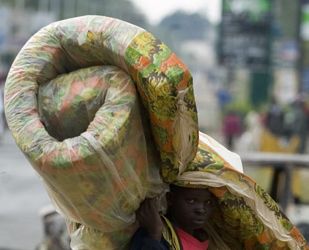Kenya president suggests coalition
Mwai Kibaki says he is ready to work with all parties in a unity government.

Government resistance
Odinga claims the vote was rigged and has refused any talks with Kibaki until the president concedes defeat.
Frazer’s visit comes after the Canadian minister for foreign affairs also met Odinga and ODM officials and Ban Ki-moon, the UN secretary-general, held separate telephone conversations with the two leaders.
| In video |
Yvonne Ndege, Al Jazeera’s correspondent in Nairobi, says Kenyans hope the weight of the US diplomatic machine will make a difference.
However the government has so far strongly resisted international mediation although Kibaki did meet Archbishop Desmond Tutu on Friday.
Tutu, a former Nobel laureate who is acting as an unofficial mediator, did suggest that Kibaki was open to the idea of a coalition government, as long as the opposition first recognised there was an elected governing authority.
Calm has largely returned to the streets of the capital, Nairobi, in recent days after opposition efforts to hold mass rallies faltered in the face of a heavy police presence.
Humanitarian concern
Police also said a curfew had been lifted in the western town of Kisumu which had witnessed some of the worst tribal violence.
However, there was growing concern for the estimated quarter of a million people who have been displaced by the clashes.
|
Your Views |
| Send us your views |
A statement from the United Nations released on Friday said an estimated 250,000 had been displaced by the unrest, with between 400,000 and 500,000 affected by the conflict.
The UN’s Office for the Co-ordination of Humanitarian Affairs (OCHA) said that at least 100,000 people in the northern Rift Valley alone needed immediate help.
Many were stranded without food, water or shelter and other essentials, it said in a statement.
The UN Children’s Fund (Unicef) and the World Food Programme were working with the Kenyan Red Cross Society to bring urgent supplies to those most vulnerable.
Local aid workers expressed fear at an outbreak of diseases in make-shift camps in schools, hospitals and churches, most of which were still out of reach owing to their inaccessibility or safety concerns.
Meanwhile, Australia has warned its nationals against travelling to Kenya joining several European countries in doing so and the US began evacuating Peace Corps workers in the west of the country to the Tanzanian capital, Dar es Salaam.
